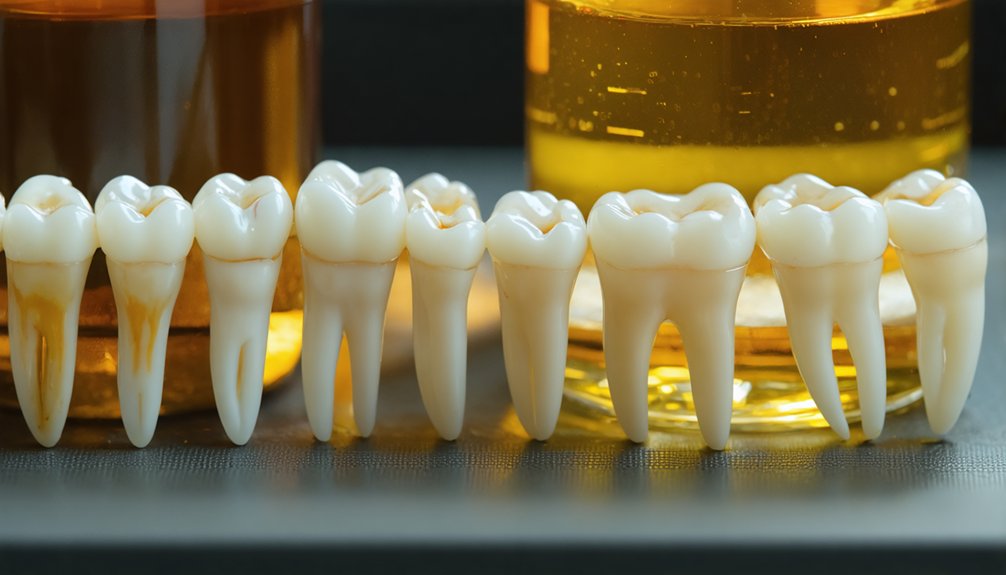Apple cider vinegar’s acetic acid content can help dissolve surface stains on your teeth, making it a natural whitening option. You’ll need to be cautious though, as ACV’s highly acidic pH (2.5-3.0) can damage tooth enamel with prolonged exposure. For safer use, dilute 2 tablespoons in 8 ounces of water and limit applications to 2-3 times weekly. Understanding proper techniques and risks will help you determine if this whitening method aligns with your dental health goals.
Key Takeaways
- Contains 5% acetic acid that effectively dissolves surface stains on teeth, making it a natural alternative to commercial whiteners.
- Provides a cost-effective whitening solution compared to expensive professional treatments, though results are more modest.
- Works primarily on superficial stains from coffee, tea, and wine, showing visible color changes in laboratory studies.
- Can be easily combined with baking soda for gentler whitening effects while maintaining its stain-removing properties.
- Offers an accessible home remedy that can produce whitening results when used properly with dilution and limited frequency.
Understanding Apple Cider Vinegar’s Whitening Properties
While apple cider vinegar (ACV) has gained popularity as a natural teeth whitening solution, its effectiveness stems primarily from its acidic properties. The acetic acid content, typically around 5%, works by dissolving surface stains from substances like coffee, tea, and red wine. Social media influencers have promoted it as a natural teeth whitener, despite lacking scientific evidence.
Laboratory studies have demonstrated ACV’s whitening effectiveness through its ability to create visible color changes in tooth enamel. However, you’ll need to understand that this whitening action occurs only on superficial stains and doesn’t affect deeper tooth discoloration.
The same acidic properties that remove stains can also lead to enamel erosion if used improperly. Scientific research reveals that ACV has a pH of 2.5-3.0, making it highly acidic and potentially damaging to teeth. While some research suggests ACV’s antimicrobial properties may help reduce plaque-causing bacteria, contributing to a brighter smile, there’s limited clinical evidence supporting its use as a primary whitening agent.
Safety Considerations and Potential Risks
When using apple cider vinegar for teeth whitening, you’ll need to dilute it in a ratio of two parts vinegar to three parts water to minimize potential damage to your tooth enamel. Due to its acidic pH level between 2.7 and 3.95, apple cider vinegar can be particularly harmful to dental health.
You should monitor your teeth for increased sensitivity to hot and cold temperatures, as this indicates potential enamel erosion and signals the need to discontinue use. Studies have shown that vinegar can cause up to 20% enamel loss with prolonged exposure.
To protect your oral health during treatment, you must wait at least 30 minutes after exposure before brushing your teeth, use a straw to minimize contact with tooth surfaces, and maintain regular dental check-ups to assess any emerging issues.
Dilution Methods and Ratios
Proper dilution of apple cider vinegar is critical for minimizing tooth enamel damage during whitening treatments. When preparing your ACV solution, you’ll need to follow specific dilution techniques to protect your oral health.
The recommended ratios vary based on your intended use: for a mouthwash, mix 1 part ACV with 2 parts water, or combine 2 teaspoons ACV with 6 ounces of water. Due to its acidic properties, ACV can permanently erode tooth enamel even when diluted, making professional whitening treatments a safer choice. For best results, use raw, unfiltered ACV with the mother intact.
If you’re planning to drink ACV, use 1 tablespoon per 8 ounces of water. Always stir the mixture thoroughly for at least one minute to guarantee proper distribution.
Remember to use a straw when drinking to minimize direct contact with teeth, and never apply undiluted ACV to your teeth. After use, wait 30 minutes before brushing and rinse thoroughly with plain water.
Monitoring Tooth Sensitivity
Monitoring your teeth’s sensitivity during apple cider vinegar treatments is essential for preventing long-term dental damage. You’ll need to pay attention to early tooth sensitivity signs, such as discomfort when consuming hot or cold foods. High acidity levels in apple cider vinegar can cause significant tooth enamel damage over time.
Regular dental checkups are vital to detect potential enamel erosion before it becomes severe.
- Watch for increased sensitivity to temperature changes in foods and beverages
- Note any burning sensation in your gums or throat during treatment
- Document changes in tooth appearance, especially yellowing or transparency
- Track how long sensitivity lasts after each treatment
If you experience persistent sensitivity, stop using apple cider vinegar immediately and consult your dentist.
Remember that your saliva’s natural buffering capacity isn’t enough to protect against repeated acid exposure, making professional monitoring vital for enamel erosion prevention.
Essential Protective Measures
Beyond monitoring sensitivity, understanding and implementing protective measures is central to safe ACV use for teeth whitening. To guarantee enamel preservation, you’ll need to dilute ACV with water before application, as its high acidity (pH 2.7-3.95) can permanently damage tooth enamel.
When applying the solution, use a straw to minimize direct contact with your teeth. Unlike ADA-approved products, apple cider vinegar lacks scientific validation for safe teeth whitening.
Always rinse your mouth thoroughly with water after ACV exposure to neutralize acid residue and protect your oral tissues from chemical burns. Since frequent exposure increases risks of enamel erosion and cavity development, limit ACV applications and avoid holding the solution in your mouth.
Before starting any ACV whitening regimen, consult your dentist for professional guidance on safe alternatives that won’t compromise your long-term oral health.
Best Practices for Using ACV on Teeth
Safe application of apple cider vinegar for teeth whitening requires careful attention to specific guidelines and protocols. For best application, always dilute 2 tablespoons of ACV in 8 ounces of water before use. According to dental experts, ACV is highly acidic and can permanently damage tooth enamel. Professional whitening treatments at Kennedy Dental offer safer and more reliable results.
Follow frequency guidelines by limiting applications to 2-3 times per week to protect your enamel. You’ll need to wait 60 minutes after use before brushing your teeth to prevent enamel damage.
- Use a straw to minimize direct contact between the solution and your teeth
- Mix your ACV solution thoroughly to guarantee proper dilution ratios
- Never apply undiluted ACV directly to your teeth or gums
- Consider combining ACV with baking soda for a gentler whitening paste
Remember to monitor your teeth for any sensitivity or adverse reactions, and consult your dentist before starting an ACV whitening routine.
Scientific Research and Evidence

While best practices provide practical guidance for ACV use, scientific research offers a more complex perspective on its teeth whitening capabilities.
Laboratory studies show that ACV can whiten teeth, but its high acidity (pH 2.5-3.0) poses significant risks to tooth enamel. Research indicates that ACV’s whitening efficacy stems from its acetic acid content, which works similarly to other acidic agents like white vinegar and hydrogen peroxide.
While apple cider vinegar may whiten teeth through acetic acid, its extreme acidity threatens enamel health similar to other acidic solutions.
However, this same acid can erode dental enamel, potentially causing long-term damage. While ACV does exhibit antimicrobial properties that may help reduce plaque-related staining, clinical evidence remains limited.
Most studies have been conducted in vitro, and there’s a notable lack of long-term human trials to confirm both safety and effectiveness for regular use.
Professional Dental Perspectives
Dental professionals consistently warn against using apple cider vinegar for teeth whitening due to its severe risks to oral health.
Professional recommendations from dental associations emphasize that the highly acidic nature of apple cider vinegar (pH 2-3) can cause permanent damage to your tooth enamel.
You’ll find that dentists strongly advocate for safer, proven alternatives like professional whitening treatments that won’t compromise your oral health.
- Once enamel erosion occurs, the damage is irreversible and can expose the yellowish dentin beneath.
- Your teeth become more susceptible to sensitivity, decay, and structural weakness.
- Professional whitening options offer customized solutions with predictable results.
- You’ll need immediate professional evaluation if you experience increased tooth sensitivity or visible changes in enamel appearance.
Comparing ACV With Other Whitening Methods

When you’re weighing professional whitening treatments against home remedies like ACV, you’ll find that professional methods offer more predictable, safer results with protective measures for your enamel.
While ACV costs considerably less than professional treatments or even over-the-counter products, its potential to cause irreversible enamel damage makes it a risky economic choice in the long run.
Professional whitening treatments and regulated home products provide a better cost-benefit ratio, as they’re specifically formulated to protect your teeth while achieving consistent whitening results.
Professional Vs Home Methods
To make an informed decision about teeth whitening, it’s essential to understand how professional treatments compare with home-based methods like apple cider vinegar.
Professional treatments deliver markedly faster and more dramatic results, with in-office procedures capable of lightening teeth up to 8 shades in just 90 minutes.
While home remedies like ACV are more accessible, their whitening effectiveness remains scientifically unproven and may pose risks to your enamel.
- Professional treatments provide immediate results and can last 1-3 years with proper maintenance
- In-office procedures use high-concentration whitening agents under dental supervision
- Home-based methods typically require weeks of consistent use for modest improvements
- Natural remedies like ACV lack clinical evidence and may damage tooth enamel through prolonged exposure to acids
Cost-Benefit Analysis
Understanding the full economic impact of teeth whitening requires a careful analysis of both short-term costs and long-term implications.
While apple cider vinegar offers an initially affordable option compared to professional treatments, you’ll need to take into account the potential dental expenses that might arise from its regular use.
A cost comparison reveals that ACV’s price point is similar to over-the-counter whitening products, but its acidic nature can lead to enamel erosion, requiring costly dental interventions.
Professional whitening treatments, though more expensive upfront, provide safer, more predictable results without risking your dental health.
When evaluating long-term implications, you’ll find that investing in professional treatments or gentler over-the-counter alternatives may prove more economical than dealing with the dental problems that could result from ACV use.
Frequently Asked Questions
How Long Does It Take to See Results From ACV Teeth Whitening?
You’ll notice minor whitening effectiveness within 1-2 weeks for light stains, with more visible results after 3-4 weeks of consistent use. Monitor teeth sensitivity closely during treatment to avoid complications.
Can I Brush My Teeth Immediately After Using Apple Cider Vinegar?
Like sandpaper on silk, brushing right after vinegar damages your teeth. Wait at least 30 minutes to protect teeth health, as immediate brushing can permanently strip away acid-softened enamel, negating any vinegar benefits.
Does Organic Apple Cider Vinegar Work Better for Teeth Whitening?
No, organic ACV doesn’t provide superior whitening effectiveness compared to non-organic varieties. While it contains “the mother,” there’s no scientific evidence that these organic benefits enhance teeth whitening results.
What Foods Should I Avoid While Using ACV for Teeth Whitening?
Like protecting a fresh canvas, you’ll need to avoid citrus fruits, acidic beverages, dark berries, wines, curry spices, and sticky sweets while whitening to prevent staining and enamel damage.
Can Children Use Apple Cider Vinegar for Teeth Whitening?
You shouldn’t use apple cider vinegar for children’s teeth whitening due to serious safety concerns. Instead, consult a pediatric dentist who can recommend age-appropriate alternative methods that won’t damage developing teeth.
References
- https://www.healthline.com/health/apple-cider-vinegar-teeth
- https://pmc.ncbi.nlm.nih.gov/articles/PMC9375849/
- https://www.fourtowndentalcare.com/blog/2023/08/14/can-apple-cider-vinegar-harm-your-teeth/
- https://www.goodrx.com/conditions/dental-care/apple-cider-vinegar-and-teeth
- https://pmc.ncbi.nlm.nih.gov/articles/PMC10024105/
- https://www.kennedydental.net/blog/apple-cider-vinegar-whiten-teeth/46524
- https://www.northboroughfamilydental.com/blog/apple-cider-vinegar-whiten-teeth/46522
- https://www.chestercountydentalarts.com/blog/is-apple-cider-vinegar-bad-for-your-teeth/
- https://www.sunbritedental.com/dental-services/cosmetic/blog/do-natural-teeth-whitening-remedies-really-work
- https://claremontsmiledesign.com/can-you-whiten-your-teeth-with-lemons-or-apple-cider-vinegar/



